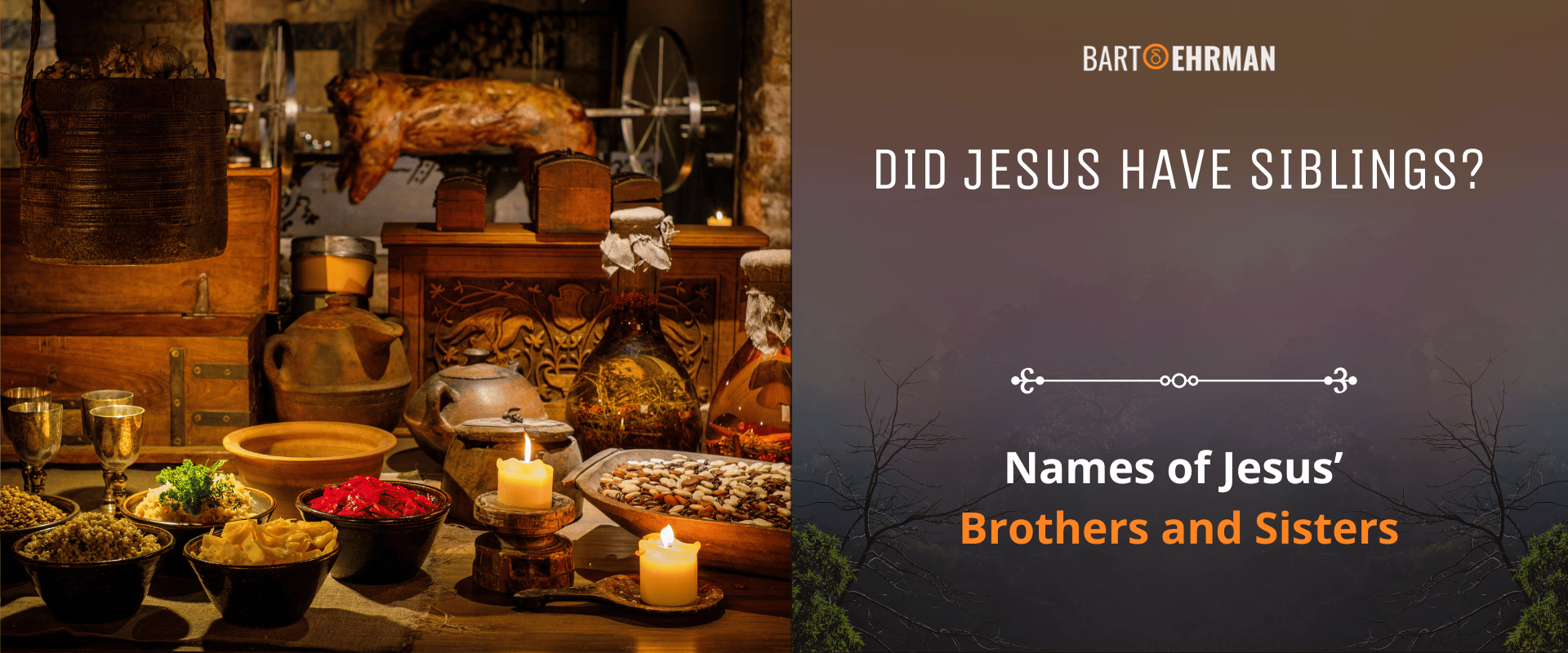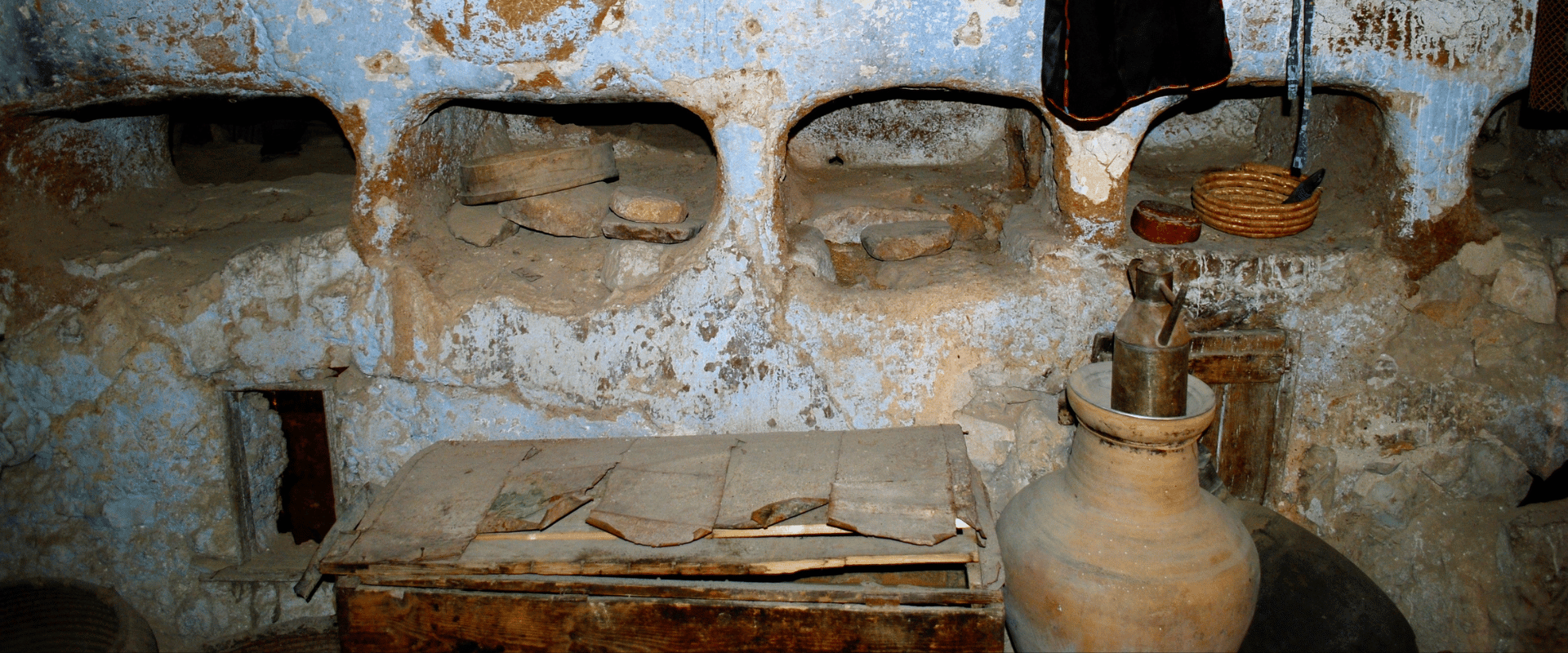Did Jesus Have Siblings? Names of Jesus’ Brothers and Sisters

Written by Joshua Schachterle, Ph.D
Author | Professor | Scholar
Author | Professor | BE Contributor
Verified! See our editorial guidelines
Verified! See our guidelines
Edited by Laura Robinson, Ph.D.
Date written: February 3rd, 2024
Disclaimer: The views and opinions expressed in this article belong to the author and do not necessarily match my own. - Dr. Bart D. Ehrman
When we think about the vast influence of Jesus, it’s hard to imagine him growing up with siblings like many of us did. So did Jesus have siblings? If so, how many did he have? Were any of them Jesus-followers? Did they believe he was the Messiah? Let’s dive in and look at what scholars say about these questions.

References to the Names of Jesus’ Siblings in Mark
The Gospel of Mark is our earliest written Gospel so let’s start there. In Mark 6, Jesus goes back to his hometown of Nazareth after preaching in other areas of Galilee. In Mark 6:3, the people of Nazareth are surprised and annoyed to hear Jesus preaching and said,
“Is not this the carpenter, the son of Mary and brother of James and Joses and Judas and Simon, and are not his sisters here with us?” And they took offense at him.
There’s a lot of information here about early Jesus traditions so let’s unpack this passage.
First of all, while Mary is mentioned, Joseph is not. In fact, Joseph isn’t mentioned anywhere in Mark. This is odd if Joseph were really Mary’s husband and Jesus’ father, since ancient Jewish lineages were traced through the father. Of course, Mark also contains no birth narratives, so we can’t be entirely sure what Jesus’ parental situation was from Mark alone.
Next, Jesus’ four brothers are named. One of these brothers, James became prominent later in the Jesus movement. The other brothers, however, are never mentioned again by name outside the Gospels. All of their names, by the way, are very common Jewish names from 1st-century Palestine (Joses is a version of the name Joseph). By the way, the Judas who was Jesus’ brother is not Judas Iscariot who would betray Jesus later.
Finally, Jesus also had sisters, but we are not told how many or what their names were. According to Mark, then, Jesus had four brothers and at least two sisters.
Do the Names of Jesus’ Siblings in Other Gospels Match Mark’s List?
We know that Matthew and Luke used Mark as a source in writing their Gospels. It would be surprising, therefore, if they didn’t also mention Jesus’ siblings.
Indeed, in describing the same return of Jesus to Nazareth, Matthew 13:55-56 repeats Mark’s line spoken by the people of Nazareth almost verbatim:
“Is not this the carpenter’s son? Is not his mother called Mary? And are not his brothers James and Joseph and Simon and Judas? And are not all his sisters with us?”
Notice how Matthew slightly modifies Mark’s text. First, Jesus is no longer a carpenter but rather “the carpenter’s son.” In addition, he changes the order of the brothers and renames Joses “Joseph.” However, the basic information is the same, with four named brothers and an unnamed number of sisters.
Interestingly, Luke doesn’t mention Jesus having any siblings at all while John mentions that Jesus had brothers but doesn’t name them.
FREE COURSE!
WHY I AM NOT A CHRISTIAN
Raw, honest, and enlightening. Bart's story of why he deconverted from the Christian faith.
Over 6,000 enrolled!
Did Jesus’ Siblings Follow Him During His Lifetime?
There are parallel passages in the Synoptic Gospels (Mark 3:31-35, Matthew 12:46-50, and Luke 8:19-21) in which this question might be answered. Here’s the version in Mark:
Then his mother and his brothers came, and standing outside they sent to him and called him. A crowd was sitting around him, and they said to him, “Your mother and your brothers are outside asking for you.” And he replied, “Who are my mother and my brothers?” And looking at those who sat around him, he said, “Here are my mother and my brothers! Whoever does the will of God is my brother and sister and mother.”
To understand the significance of this passage, you have to understand the significance of family in ancient Palestine. As K.C. Hanson and Douglas Oakman write, “in ancient Mediterranean societies during the first century, kinship was still the primary social domain… Virtually no social relationship, institution, or value set was untouched by the family and its concerns.” In other words, family was the largest component of a person’s identity.
And yet here we see Jesus effectively rejecting his family in favor of “those who do the will of God.” This clearly indicates Jesus’ stance on his own family but may also indicate that his family were not following him in his ministry.
Further indication comes from Mark 3:20-21:
Then he [Jesus] went home, and the crowd came together again, so that they [Jesus’ family] could not even eat. When his family heard it, they went out to restrain him, for people were saying, “He has gone out of his mind.”
It would appear that Jesus’ family believed that he was crazy, since they tried to restrain him. I think it’s safe to say that Jesus’ brothers did not follow him during his lifetime.
The Gospel of John seems to agree with this assessment. In John 7:3-5, Jesus is reluctant to go to Judea since the authorities there want to kill him. His brothers, however, want him to go anyway:
So his brothers said to him, “Leave here and go to Judea so that your disciples also may see the works you are doing, for no one who wants to be widely known acts in secret. If you do these things, show yourself to the world.” (For not even his brothers believed in him).
Note that no mention is made specifically of Jesus’ sisters here, but the general family attitude toward Jesus is clear. Also, the Greek word used in the Bible for brothers, adelphoi, can mean either “brothers” or “brothers and sisters,” so it’s hard to know whether the sisters were part of this exchange.
What Happened to Jesus’ Siblings After His Death?
The first mention of Jesus’ family outside the Gospels is in Acts 1:14. We are told that after Jesus’ death, the disciples were “were constantly devoting themselves to prayer, together with certain women, including Mary the mother of Jesus, as well as his brothers.” Remember again that “brothers” here might mean “brothers and sisters,” although we can’t know for sure.
It appears, then, that Jesus’ family had a change of heart, either at the end of his ministry or after his death. We know, for example, that Jesus’ brother James became a major leader in the Jerusalem church, along with Peter.
Paul mentions visiting James on a visit to Jerusalem in Galatians 1:18-19 :
Then after three years I did go up to Jerusalem to visit Cephas [Peter] and stayed with him fifteen days, but I did not see any other apostle except James the Lord’s brother.
Paul seems to indicate here that James was considered an apostle, a high-status position in the early church. While none of Jesus’ other brothers or sisters is mentioned by name, it would seem from Acts that several, if not all of them, became part of the Jesus-following community along with Jesus’ mother Mary.
Paul gives us more indications of this in 1 Corinthians 9:5, where he speaks about the loneliness of his preaching journeys:
Do we not have the right to be accompanied by a believing wife, as do the other apostles and the brothers of the Lord and Cephas [Peter]?
Apparently, Jesus’ brothers went on missionary journeys for the church, sometimes accompanied by their wives. Again, we see that Jesus’ brothers formed an important part of the Jesus community after his death.

Were There Later Traditions About Jesus’ Siblings?
Geoffrey Bromiley notes that starting in the 2nd century, Christians began to emphasize chastity and virginity more than they had before. This eventually led to monastic traditions in the 3rd century in which even sex within marriage was considered impure and sinful. Therefore, it became unthinkable that after giving birth to Jesus, Mary had merely gone on to have a normal married life by bearing more children.
This ultimately led to the idea that Mary had remained a virgin even during and after the birth of Christ, a doctrine known as the perpetual virginity of Mary which the Catholic Church and several other denominations still believe. How then, could the mention of Jesus’ siblings in the Gospels and elsewhere be explained?
Several important theologians from the 2nd to the 4th centuries posited that the other children were from a previous marriage of Joseph’s. Mary helped to raise these other children but did not give birth to them. This is still the official view of some churches.
The Catholic Church, following 4th-century Christian author Jerome, now takes the position that the siblings of Jesus mentioned in the Gospels were actually his cousins, although they were raised in the same house with Jesus.
Conclusion
According to Mark, our first written Gospel, Jesus had four brothers: James, Joses, Judas, and Simon. He also had at least two sisters, although they are unnamed. Matthew agrees with this list, although he modifies the name “Joses,” changing it to the more common version “Joseph.”
Jesus' brothers (and possibly sisters) probably did not follow him during his lifetime. There are passages in Mark and Matthew in which Jesus rejects his family and calls those who do the will of God his family. Those Gospels also say that when Jesus returned to his hometown of Nazareth, his family thought he was crazy and may have attempted to restrain him from his preaching and healing activities. The book of John explicitly says that his brothers did not believe in him.
However, after his death, the book of Acts says that his brothers and his mother were part of the earliest group of post-crucifixion Jesus-followers. In addition, one of Jesus' brothers, James, became a leader in that early community while Jesus’ other brothers went on preaching journeys on behalf of the community.
In the centuries after Jesus’ death, Christian authors developed the notion that Mary had maintained lifelong virginity. They accordingly came up with theories of who the named brothers of Mark and Matthew could have been. Some said that they were the children of Joseph’s previous marriage, while others decided they were Jesus’ cousins. These views are still maintained by several denominations.
FREE COURSE!
WHY I AM NOT A CHRISTIAN
Raw, honest, and enlightening. Bart's story of why he deconverted from the Christian faith.
Over 6,000 enrolled!
